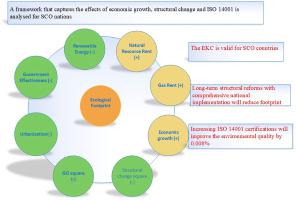Journal of Cleaner Production ( IF 9.7 ) Pub Date : 2023-05-29 , DOI: 10.1016/j.jclepro.2023.137542 Evans Opoku-Mensah , Weide Chun , Priscilla Tuffour , Wei Chen , Richard Adu Agyapong

|
The Shanghai Cooperation Organizations (SCO) nations are suffering from hydro-climatic threats and permafrost thaw, with issues related to floods upsurging. Existing studies on the SCO have mainly focused on ethnic separatism and the fight against regional terrorism. Recently,the need for structural adjustment in economic activities and ISO 14001 certification has gained attention among academicians yet no study has examined their nonlinear effects on ecological footprint. Using data from 2003 to 2019 and the Fully Modified OLS focusing on the eight permanent SCO nations, this study tests the environmental Kuznets Curve (EKC) validity and investigates the linear and nonlinear effects of structural change and ISO 14001 certification on ecological footprint. The empirical results confirm the EKC hypothesis. Next, enough evidence has been found that the nature of current structural reform is inadequate to improve their environmental quality, and a shift from short-term, sector-specific reforms to longer-term, holistic solutions will improve SCO environmental quality by 0.092%. Finally, doubling ISO 14001 certifications will improve the environmental quality by 0.008%. As recommendations, policymakers in developing economies should adopt the EKC postulate as the theoretical basis for policies favouring economic growth. Also, to encourage ISO 14001 implementation, there should be awareness creation about its benefits through workshops and conferences, and governments should provide financial incentives to encourage firms to implement the policy.
中文翻译:

利用结构变化和 ISO 14001 认证减少上海合作组织国家的生态足迹
上海合作组织 (SCO) 成员国正遭受水文气候威胁和永久冻土融化,以及与洪水泛滥有关的问题。现有关于上海合作组织的研究主要集中在民族分裂和打击地区恐怖主义方面。近年来,经济活动结构调整的需要和ISO 14001认证受到了院士的关注,但还没有研究考察它们对生态足迹的非线性影响。本研究使用 2003 年至 2019 年的数据和针对上合组织八个永久成员国的完全修改后的 OLS,测试了环境库兹涅茨曲线 (EKC) 的有效性,并调查了结构变化和 ISO 14001 认证对生态足迹的线性和非线性影响。实证结果证实了 EKC 假设。下一个,已有足够证据表明,当前结构性改革的性质不足以改善其环境质量,从短期的、针对特定领域的改革转向长期的、整体的解决方案将使上合组织的环境质量提高 0.092%。最后,将 ISO 14001 认证翻一番将使环境质量提高 0.008%。作为建议,发展中经济体的政策制定者应采用 EKC 假设作为有利于经济增长的政策的理论基础。此外,为鼓励实施 ISO 14001,应通过研讨会和会议提高对其益处的认识,政府应提供财政激励措施以鼓励企业实施该政策。从短期的、针对特定部门的改革转向长期的、整体的解决方案将使上合组织的环境质量提高 0.092%。最后,将 ISO 14001 认证翻一番将使环境质量提高 0.008%。作为建议,发展中经济体的政策制定者应采用 EKC 假设作为有利于经济增长的政策的理论基础。此外,为鼓励实施 ISO 14001,应通过研讨会和会议提高对其益处的认识,政府应提供财政激励措施以鼓励企业实施该政策。从短期的、针对特定部门的改革转向长期的、整体的解决方案将使上合组织的环境质量提高 0.092%。最后,将 ISO 14001 认证翻一番将使环境质量提高 0.008%。作为建议,发展中经济体的政策制定者应采用 EKC 假设作为有利于经济增长的政策的理论基础。此外,为鼓励实施 ISO 14001,应通过研讨会和会议提高对其益处的认识,政府应提供财政激励措施以鼓励企业实施该政策。发展中经济体的政策制定者应采用 EKC 假设作为有利于经济增长政策的理论基础。此外,为鼓励实施 ISO 14001,应通过研讨会和会议提高对其益处的认识,政府应提供财政激励措施以鼓励企业实施该政策。发展中经济体的政策制定者应采用 EKC 假设作为有利于经济增长政策的理论基础。此外,为鼓励实施 ISO 14001,应通过研讨会和会议提高对其益处的认识,政府应提供财政激励措施以鼓励企业实施该政策。











































 京公网安备 11010802027423号
京公网安备 11010802027423号